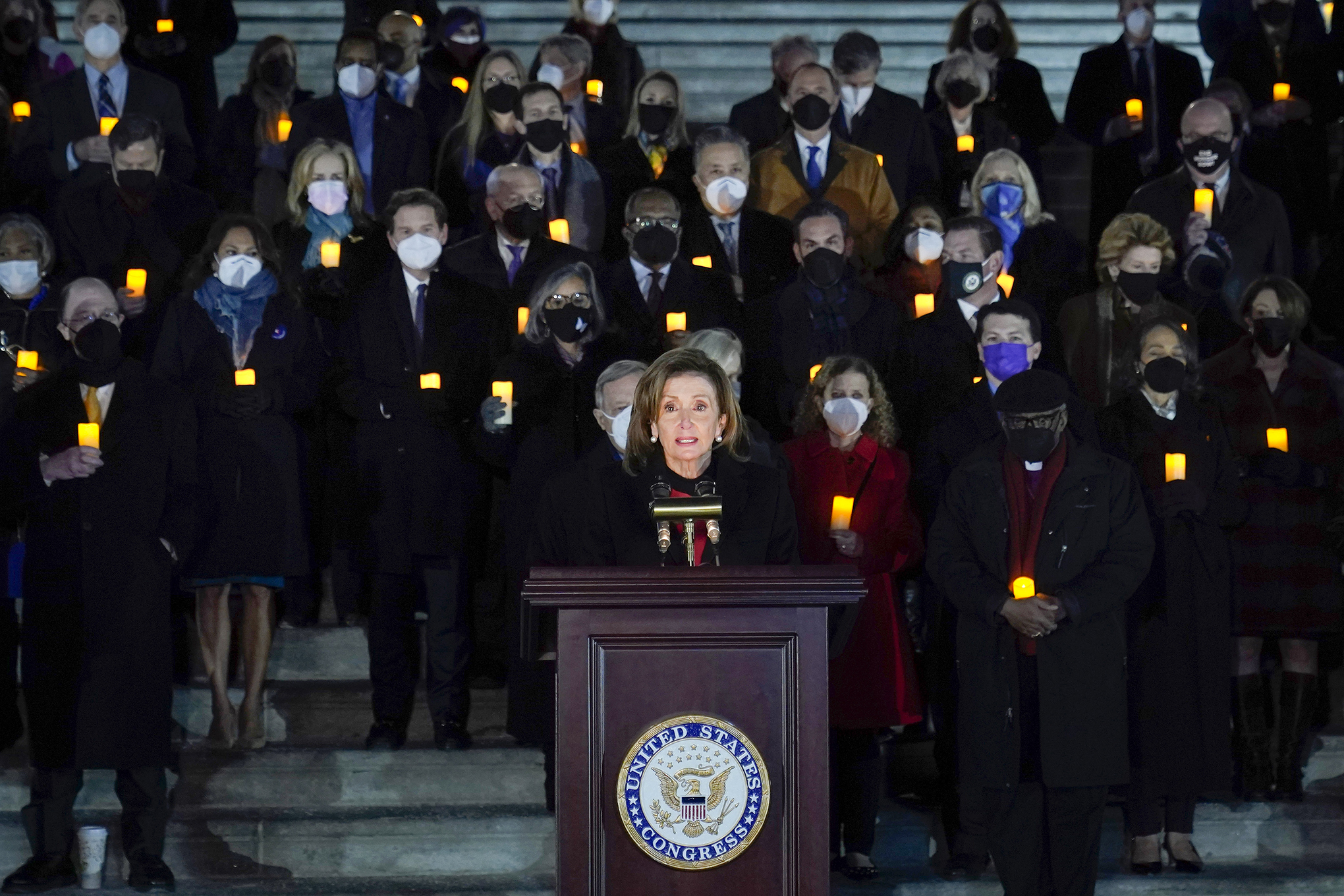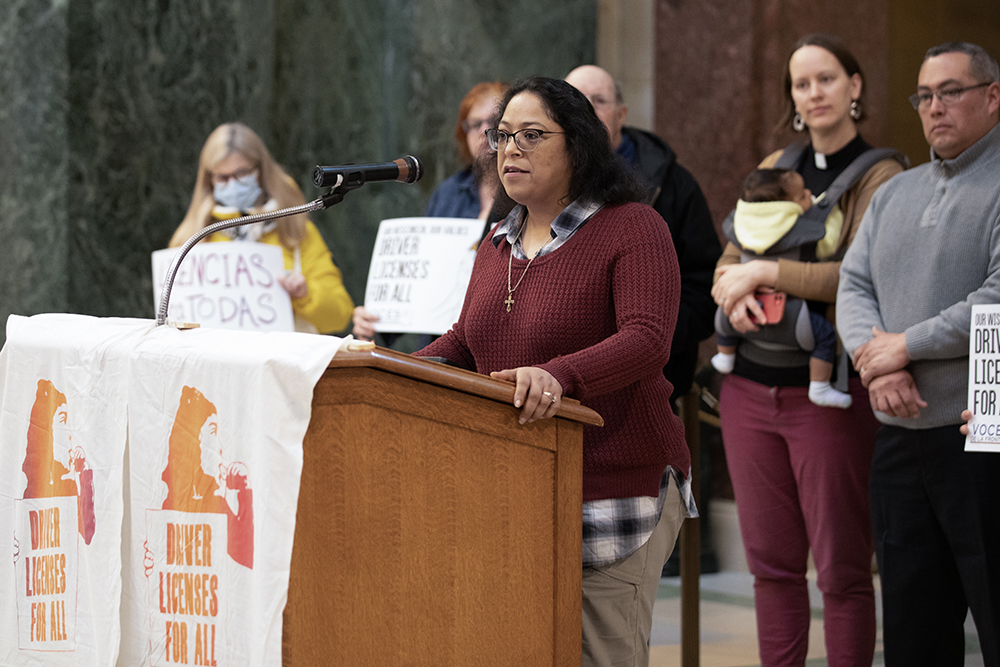The Wisconsin Department of Health Services received this week its first allotment of two oral antiviral treatments that are designed to combat the spread of COVID-19. Supplies of about 5,300 are expected to begin distribution on Friday, according to the La Crosse Tribune.
Health officials said that the pills are earmarked for those who are high risk of severe illness and hospitalization and should be used in conjunction with other strategies to thwart the spread of COVID-19, like social distancing and mask wearing.
“While these new antiviral pills may help treat COVID-19, it’s important to remember these drugs are not a substitution for protecting yourself by getting vaccinated and wearing a mask in public places,” said DHS Secretary-designee Karen Timberlake.
News with a little more humanity
WPR’s “Wisconsin Today” newsletter keeps you connected to the state you love without feeling overwhelmed. No paywall. No agenda. No corporate filter.
The treatments of molnupiravir and Paxlovid are currently in short supply nationwide. Timberlake told the newspaper that this being the case, officials will seek to disperse the pills across the state.
“We are committed to distributing these pills equitably across the state, and access will increase as Wisconsin receives more allocations from the federal government,” she said.
Wisconsin DHS: COVID-19 weekly recap
Over the December holidays, Wisconsin surpassed 10,000 deaths since the pandemic began. And the state had a record number of cases three times this week alone.
The seven-day average for new COVID-19 cases in Wisconsin is 7,637 as of Friday. The Wisconsin Department of Health Services has confirmed 10,271 total deaths from the disease.
In Wisconsin, 58.3 percent of people are fully vaccinated — 81.9 percent of people age 65 and older, 52.8 percent of children age 12 to 17 and 16 percent of children 5 to 11 years old.
As more people become infected with the omicron variant, demand for at-home COVID-19 tests has skyrocketed. Those tests are eligible for reimbursement through health flexible spending arrangements, health savings accounts, health reimbursement arrangements or Archer medical savings accounts, according to the IRS. The agency also said costs for personal protective equipment can be reimbursed.
NPR interviewed pediatrician Ibukun Kalu about how the virus and its variants affect children age 5 and under.
“In kids, partly because COVID seems to cause the initial infection and then just track through the body and cause post-COVID syndromes, it is worse than influenza,” Kalu told NPR. “And currently we are seeing influenza spread in our community. But COVID is just outpacing that across the board.”
The American Academy of Pediatrics says in its latest report that COVID-19 cases among children have reached the highest case count ever reported since the start of the pandemic — and hospitalizations are rising across the country.
In Wisconsin, 13 pediatric patients on average are being admitted to the hospital with COVID-19 every day, according to federal data for the week ending Jan. 5. That’s a 71 percent increase from the previous week, according to the Centers for Disease Control and Prevention.
COVID-19 overwhelms hospitals, leaving people untreated for other maladies
America’s health care system is so strained by COVID-19 that it can’t care for everyone who needs medical attention — whether sick with coronavirus or with a severe viral infection, heart attack, stroke, car crash or other malady, The Journal Times reported.
Dr. Anthony Fauci, top medical adviser to President Joe Biden, predicted the current surge fueled by the omicron variant may continue through the end of January. As of last Friday, 1,710 COVID-19 patients were hospitalized in Wisconsin, pushing the system to the brink.
Reporter Adam Rogan shares the stories of just some of the patients being denied medical care due to the lack of hospital staff and beds available.
Powerball tickets sold in Wisconsin, California split $632M
Powerball tickets sold in Wisconsin and California were winners of the latest jackpot and will split $632 million. The Wisconsin Lottery says the winning ticket in its state was sold in a Green Bay suburb at a Citgo station on Packerland Drive.
The retailer will receive $100,000 for selling the winning ticket.
The California Lottery says the winning ticket in California was sold at a 7-Eleven in Sacramento.
The winners have a cash option of splitting $450 million. The jackpot is one of the largest in the history of the Powerball game, but didn’t rank among the Top 10 largest in U.S. lottery history.
The winning numbers for the Powerball jackpot drawn Wednesday night were 6, 14, 25, 33 and 46. The Powerball was 17.
Milwaukee acting mayor: Ongoing turmoil of violence must end
Several shootings in Milwaukee during the morning hours of New Year’s Day prompted the city’s acting mayor to immediately call for reducing violence in 2022.
A 40-year-old man was killed and at least two other people were injured in separate shootings last Saturday morning. One of the injured was a 9-year-old boy.
Milwaukee Acting Mayor Cavalier Johnson called it “an unacceptable continuation of the gun violence that marred 2021” and said the “ongoing turmoil must end.”
Johnson said he plans to finalize Milwaukee’s new public safety and violence reduction plan and said there is “no higher priority” for his administration that reducing violence.
The Milwaukee Police Department crime dashboard and Milwaukee County Sheriff’s Office reports the city had a record-breaking 197 homicides in 2021.
Johnson attended an annual vigil last Thursday that honored those killed in 2021, the second year in a row the city saw record-breaking violence. In 2020, there were 190 homicides in Milwaukee, that is more than double the figure from 2019 and beats a 1991 record by 15 percent, according to the Milwaukee Journal Sentinel. Homicides in Milwaukee declined 34 percent from 2015 to 2019, when 97 homicides were reported, the Journal Sentinel reports.
“Violence, especially deadly violence — it harms not just the person they’re aiming that violence towards. It has a ripple effect to their family. When you kill somebody, you’re not just taking their life, you’re taking a little piece of their mom away, you’re taking a little piece of their brother away, and their father and so on and so forth. It’s irreparable harm to our community,” Johnson said, according to the Journal Sentinel.
The vigil honored 214 people — including those killed in officer shootings and incidents ruled justified self-defense — by having their name read aloud and printed on a candle.
The vigil was organized by Northcott Neighborhood House, a community center and has been happening for decades, the Journal Sentinel reports.
Irregular menstrual cycles may prevent women from accessing abortions
In a study published Tuesday, University of Wisconsin-Madison professor of sociology Jenna Nobles found those with irregular periods in states with restrictions may be less likely to access legal abortion.
Nobles told The Cap Times that most people learn about “a highly stylized version” of menstruation: 28-day cycles, ovulation on day 14.
“The reality is that describes about 1 percent of cycles,” she told the paper. “Variability across people and across cycles for individual people is much more common.”
The researchers — which included UW-Madison graduate student Lindsay Cannon and Allen Wilcox, a researcher at the National Institute of Environmental Health — found nearly a quarter of women experience irregular menstruation — consecutive cycles that differ by an average of more than seven days.
“The window between learning about a pregnancy (the missed period) and fetal cardiac activity is very short for people with highly regular cycles — it is only a few days,” Nobles said. “For some people with irregular cycles, that window may not exist at all, precluding access to legal abortion.”
Officials say staffing for snowplows in Rock County poses future problems
While Rock County’s highway division expects to field a roster of snowplow drivers this winter, the forecast for what staffing will look like in the future appears uncertain, the Janesville Gazette reported.
Nick Elmer, Rock County assistant public works director, told the newspaper that they’re anticipating half of its drivers for the county’s snowplow fleet might turn over in the next few years as many current employees retire. He added that at the same time, there’s a reduction in the number of applicants for existing openings. Elmer said they’re seeing fewer drivers locally who have training or commercial driver’s licenses.
“Right now, it hasn’t been an issue. We’ve still been able to get guys in. But it’s getting harder and harder. Some things we’re having some internal discussions about is the (commercial driver’s license) component,” Elmer said.
Officials said that if staffing problems emerge, some residents and motorists might notice it will take longer for crews to clear the roads. Elmer told the paper that they’re responsible for clearing 13 county routes, 17 township routes and 30 state highway routes, including parts of Interstate 90/39.

Members of Congress reflect on Capitol insurrection 1 year later
Politico spoke with 13 Congress members about their experiences and reflections one year following the Capitol riot on Jan. 6, 2021.
Republicans and Democrats both shared their thoughts on the state of U.S. democracy and the politics at play following the fatal event, though only two Republicans attended a memorial held Thursday at the Capitol (Representative Liz Cheney of Wyoming and her father, Dick Chaney). Some Senate Republicans were out of town for a former colleague’s funeral.
Here are some highlights:
Sen. Patty Murray, D-Washington: “I always felt safe going into the Capitol. The only times I have not felt safe were on 9/11 and on Jan. 6. I feel safe going now, but I’ll always have that tiny little question mark in my mind.”
Rep. Brian Fitzpatrick, R-Pennsylvania: “If we implode on each other, if we start to erode our institutions, lose faith in our institutions, that will be the end of democracy. And I don’t think people realize how fragile democracy is, how young it is, and how susceptible it is to that.”
Rep. Sean Casten, D-Illinois: “I’m not angry anymore. I’m just trying to figure out what do you do when you have been entrusted with responsibility as a member of the United States Congress — and a significant faction of your colleagues stood down when somebody tried to kill you.”
Sen. John Thune, R-South Dakota: “As we look to the future, the more that we get out there and talk about ideas, principles, and identify and relate to people where they’re at … the better chance we’ll have of being an electable governing majority for the future. And the more we dwell on what happened in the past, people are going to find a ceiling.”
Editor’s note: The Associated Press contributed to this report.
Wisconsin Public Radio, © Copyright 2026, Board of Regents of the University of Wisconsin System and Wisconsin Educational Communications Board.






